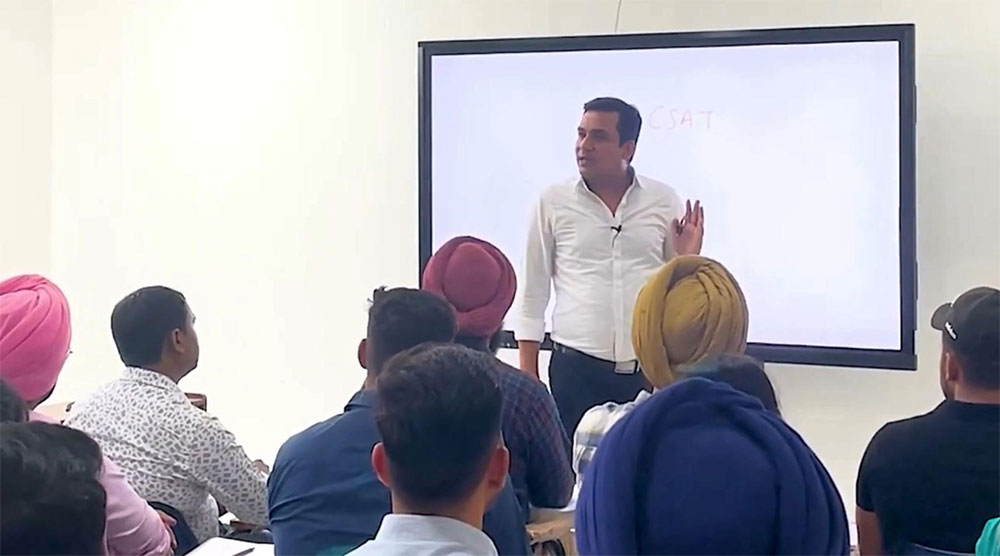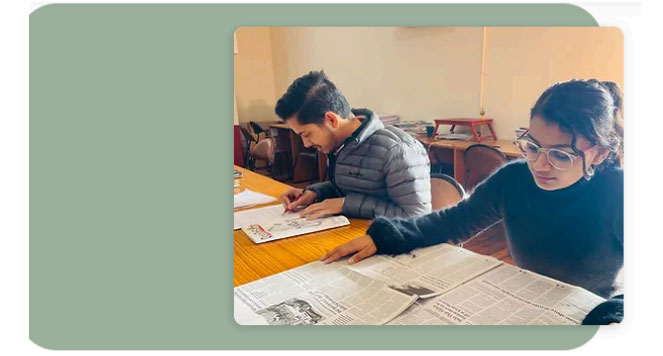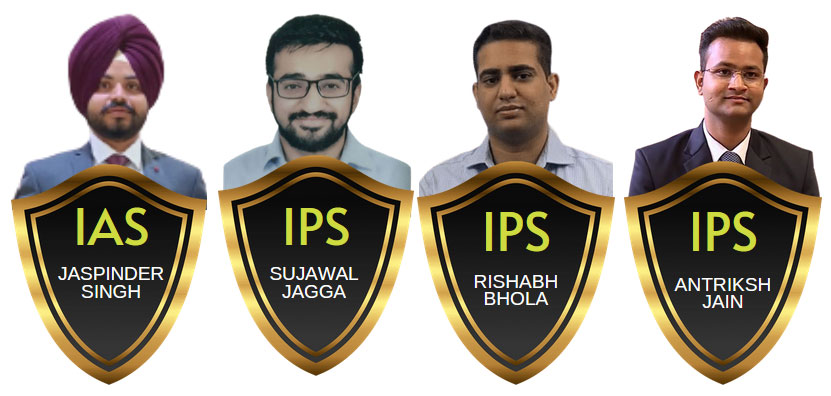Enhance your capability of scoring 300+ in
your Optional
Political Science &
International Relations
Optional Course
A Comprehensive all iin one course with lectures, doubt sessions, test series and
mentorship
Meet the Mentor
Chetan Sharma
- B.Tech from Glasgow University, Scotland
- M.A. (Political Science)
- LLB
with a passion for teaching with 10+ years of mentoring and empowering students to reach their full potential, he has moulded hundereds of aspirants into Civil servants of today. From being awarded as Indian Icon to being facilitated by Govt. of Punjab for being the best in UPSC/PCS Coaching, Chetan Sharma’s accomplishments reflect a deep commitment to excellent in education.

Course Features
Our online PSIR optional course is an all in one comrehensive course offering
everything required for a UPSC spirant to score well in their optional
24 Hour
Access to Lectures
Consolidated ready to use Notes
Interlinked
with other GS Subjects
Section & full length tests
Live doubt sessions

Thanks to Chetan Sir’s mentorship, I scored 90% in my optional

Thanks to Chetan Sir’s mentorship, I scored 90% in my optional

Thanks to Chetan Sir’s mentorship, I scored 90% in my optional
Join the league of Toppers...
Why Choose PSIR Optional?

Overlap with
GS Syllabus
Our online PSIR optional course is an all in one comrehensive course offering everything required for a UPSC spirant to score well in their optional
Abundant Study
Material
Standard textbooks, reference books and access to substantial number of previous years’ question papers and model answers helps in understanding the exam pattern


Current Affairs
Preparation
Studying PSIR provides insights to global politics, policy making and international relations, which helps in developing a well informed perspective on current levels
Scoring Potential
Historical data shows that PSIR has been a scoring subject for many candidates due to its well-organized content and the ability to present clear, argument driven answers


Analytical Skills
Development
It encourages in engaging with various viewpoints and arguments, enhancing your ability to write insightful answers & in interview
Blog

Frequently Asked Questions?
What is the syllabus for PSIR optional in the UPSC exam?
The PSIR syllabus for UPSC is divided into two papers:
Syllabus of PSIR Paper - I
Political Theory and Indian Politics:
Political Theory: meaning and approaches.Theories of state: Liberal, Neo-liberal, Marxist, Pluralist, Post-colonial, and Feminist.Justice: Conceptions of justice with special reference to Rawl’s theory of justice and its communitarian critiques.Equality: Social, political, and economic; the relationship between equality and freedom; Affirmative action.Rights: Meaning and theories; different kinds of rights; Concept of Human Rights.Democracy: Classical and contemporary theories; different models of democracy—representative, participatory and deliberative.Concept of power: hegemony, ideology, and legitimacy.Political Ideologies: Liberalism, Socialism, Marxism, Fascism, Gandhism, and Feminism.Indian Political Thought: Dharmashastra, Arthashastra, and Buddhist Traditions; Sir Syed Ahmed Khan, Sri Aurobindo, M. K. Gandhi, B. R. Ambedkar, M. N. Roy.Western Political Thought: Plato, Aristotle, Machiavelli, Hobbes, Locke, John S. Mill, Marx, Gramsci, Hannah Arendt.Indian Government and Politics
Indian Government and Politics(a) Political Strategies of India’s Freedom Struggle: Constitutionalism to mass Satyagraha, Noncooperation, Civil Disobedience; Militant and Revolutionary Movements, Peasant and Workers Movements.
(b) Perspectives on Indian National Movement; Liberal, Socialist, and Marxist; Radical Humanist and Dalit.Making of the Indian Constitution: Legacies of the British rule; different social and political perspectives. Salient Features of the Indian Constitution: The Preamble, Fundamental Rights and Duties, Directive Principles; Parliamentary System and Amendment Procedures; Judicial Review and Basic Structure doctrine.(a) Principal Organs of the Union Government: Envisaged role and actual working of the Executive, Legislature, and Supreme Court.
(b) Principal Organs of the State Government: Envisaged role and actual working of the Executive, Legislature, and High Courts. Grassroots Democracy: Panchayati Raj and Municipal Government; Significance of 73rd and 74th Amendments; Grassroot movements.Statutory Institutions/Commissions: Election Commission, Comptroller and Auditor General, Finance Commission, Union Public Service Commission, National Commission for Scheduled Castes, National Commission for Scheduled Tribes, National Commission for Women; National Human Rights Commission, National Commission for Minorities, National Backward Classes Commission.Federalism: Constitutional provisions; changing nature of center-state relations; integrationist tendencies and regional aspirations; inter-state disputes.Planning and Economic Development: Nehruvian and Gandhian perspectives; Role of planning and public sector; Green Revolution, land reforms and agrarian relations; liberalization and economic reforms.Caste, Religion, and Ethnicity in Indian Politics.Party System: National and regional political parties, ideological and social bases of parties; Patterns of coalition politics; Pressure groups, trends in electoral behavior; changing socio-economic profile of Legislators. Social Movement: Civil liberties and human rights movements; women’s movements; environmentalist movements.
Syllabus of PSIR Paper - II
Comparative Politics and International Relations
Comparative Political Analysis and International Politics:
Comparative Politics: Nature and major approaches; Political economy and political sociology perspectives; Limitations of the comparative method.
State in Comparative Perspective: Characteristics and changing nature of the State in capitalist and socialist economies, and advanced industrial and developing societies.
Politics of Representation and Participation: Political parties, pressure groups and social movements in advanced industrial and developing societies.
Globalisation: Responses from developed and developing societies.
Approaches to the Study of International Relations: Idealist, Realist, Marxist, Functionalist and Systems theory.
Key Concepts in International Relations: National interest, security and power; Balance of power and deterrence; Transational actors and collective security; World capitalist economy and globalisation.
Changing International Political Order:
(a) Rise of superpowers; Strategic and ideological Bipolarity, arms race and cold war; Nuclear threat;
(b) Non-aligned movement: Aims and achievements.
(c) Collapse of the Soviet Union; Unipolarity and American hegemony; Relevance of non-alignment in the contemporary world.
Evolution of the International Economic System: From Bretton woods to WTO; Socialist economies and the CMEA (Council for Mutual Economic Assistance); Third World demand for new international economic order; Globalisation of the world economy.
United Nations: Envisaged role and actual record; Specialized UN agencies—aims and functioning; the need for UN reforms.
Regionalisation of World Politics: EU, ASEAN, APEC, AARC, NAFTA.
Contemporary Global Concerns: Democracy, human rights, environment, gender justice terrorism, nuclear proliferation.
India and the World
Indian Foreign Policy: Determinants of foreign policy; the institutions of policy-making; continuity and change.
India’s Contribution to the Non-Alignment Movement Different phases; current role.
India and South Asia:
(a) Regional Co-operation: SAARC-past performance and future prospects.
(b) South Asia as a Free Trade Area.
(c) India’s “Look East” policy.
(d) Impediments to regional co-operation: River water disputes; illegal cross-border migration; Ethnic conflicts and insurgencies; Border disputes.
India and the Global South: Relations with Africa and Latin America; Leadership role in the demand for NIEO and WTO negotiations.
India and the Global Centres of Power: USA, EU, Japan, China and Russia.
India and the UN System: Role in UN Peace-keeping; Demand for Permanent Seat in the Security Council.
India and the Nuclear Question: Changing perceptions and policy.
Recent developments in Indian Foreign Policy: India’s position on the recent crises in Afghanistan, Iraq, and West Asia, growing relations with US and Israel; Vision of a new world order.
What are the recommended books and study materials for PSIR?
For PSIR, the following books and materials are highly recommended:
- Western political thought-IGNOU notes
- Theory- IGNOU Notes + Andrew Haywood or OP Gauba
Is PSIR a scoring subject for the UPSC exam?
Yes, PSIR is considered a scoring optional subject for the UPSC exam. Many toppers have opted for PSIR and scored high marks, attributing their success to the logical structure of the subject, overlap with General Studies, and the ability to incorporate current affairs into answers. With proper understanding and strategy, PSIR can significantly contribute to the overall score.
How does PSIR overlap with the General Studies (GS) syllabus?
GS Paper II (Polity and Governance):Indian Constitution, Parliament, Judiciary, federal structure, and governance issues.
GS Paper III (International Relations):India's foreign policy, relations with neighbors, global organizations, and current international issues.
GS Paper I (Society): Topics like social movements, secularism, and social justice align with PSIR.
Essay Paper: PSIR topics often provide rich material for essays, particularly on political, international, and governance issues.This overlap helps in reducing the overall study load and reinforcing concepts across different papers.
Can I choose PSIR if I don’t have a background in political science?
Yes, you can choose PSIR even if you don’t have a background in political science. Many candidates without prior knowledge in the subject have successfully cleared the UPSC exam with PSIR as their optional. The syllabus is manageable with consistent study, and the concepts, while initially complex, become easier to grasp with regular reading and practice. Moreover, the subject’s relevance to current affairs and governance makes it accessible to all aspirants.
How do I balance PSIR preparation with other UPSC preparation?
Balancing PSIR with the rest of your UPSC preparation requires a well-planned strategy:
Integrated Study Plan: Use the overlap between PSIR and GS papers to study topics that are common to both. This saves time and reinforces your understanding.Daily Study Schedule: Allocate specific hours daily to PSIR while ensuring that GS, essay writing, and current affairs are also covered.Regular Revision: Keep revising the PSIR topics frequently to retain concepts and theories. Short notes can be helpful.Answer Writing Practice: Regularly practice answer writing for both PSIR and GS. This not only improves your writing speed but also helps in structuring answers effectively.Stay Updated: Keep up with current affairs and try to link them with PSIR concepts. This will help you write dynamic answers in the exam.
Got More Questions?
Leave your details & our team will get back
CONTACT
CBL HEAD OFFICE & CBL Offline
ISBT 43, First Floor, Sector 43,
Chandigarh, 160036
24*7 Helpline: +91-97793 53344
UPSC: +91-86999 97935
PCS: +91-97796 13745
Email: info@chetanbharat.com


